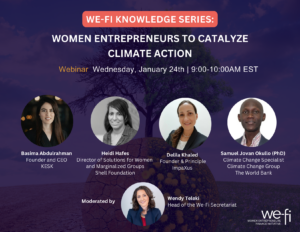Iraq’s power grid supplies less than 70% of the power needed by the growing country in the Middle East. As a result, businesses and homes use diesel generators to make up the difference, paying as much as 10 times more for the power, says Basima Abdulrahman, founder of KESK, a renewable energy company based in Baghdad.
She launched KESK in Erbil five years ago. With 50 clients across the country, KESK helps businesses transition to sustainable and lower-cost energy. The company is developing a platform to help companies monitor and control their solar power use, and potentially access carbon markets.
Abdulrahman shared her story in a recent webinar co-organized by We-Fi. Entrepreneurs, researchers, and finance experts have been convening in an ongoing webinar series to explore the role of women entrepreneurs in the green economy, and how to restructure the finance system to help them.
Abdulrahman’s success so far points to a great under-tapped resource: Women innovators in developing markets. Because of their active role in communities, women founders are well positioned to see where the short-term impact of the climate crisis creates opportunities to build large and scalable companies. For Abdulrahman, this insight came in the form of how much more businesses in Iraq paid when they had to use diesel, adding to the already high cost of doing business “For the majority of … businesses in Iraq, operational costs are a severe obstacle,” she said.
Yet, when women have insights and ambition to start companies, the structure of today’s finance system holds them back.
While women represent about 30% of the population of startup founders across time and countries, only 10–15% of founders who receive venture capital and private equity are women, University of Toronto researcher Camille Hebert said in the webinar, referring to previous research. She presented research findings at another We-Fi webinar. The numbers are even lower in climate tech, where women-led businesses receive only 6.9% of venture dollars, according to 2023 Crunchbase data.
In analyses using French administrative data and surveys of companies founded between 2002 and 2018, Hebert detailed evidence showing how gender stereotypes hold women back. The findings include:
- Female-founded startups are more likely to exist and to have higher revenue than male-founded startups after three years, suggesting women founders are subject to a higher bar in the beginning.
- Female entrepreneurs who sort into male-dominated sectors are not significantly different from men who pursue high-growth entrepreneurship. Yet, highly skilled and motivated women in climate sectors such as manufacturing, transportation, agriculture and waste, are less likely to access external equity and venture financing. This gap disappears in female-dominated sectors.
- Female-founded startups raise more in equity financings when the lead investment partner is a woman.
The We-Fi webinars suggest one way to protect people from the risks of the climate crisis is to help decisionmakers within the financial ecosystem better see the opportunities women innovators present. Tens of thousands of companies such as KESK could arise from those changes.
In short, Abdulrahman is the exception that proves the rule. Widely recognized as a greentech pioneer, she has been on World Economic Forum Foundation board of directors, and a winner of the Cartier Women’s Initiative.


